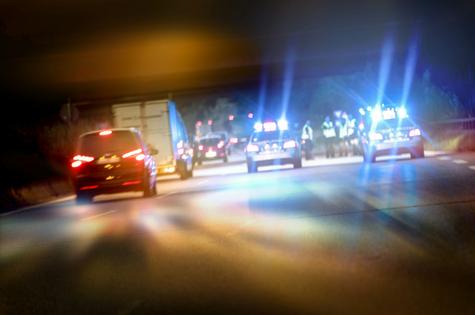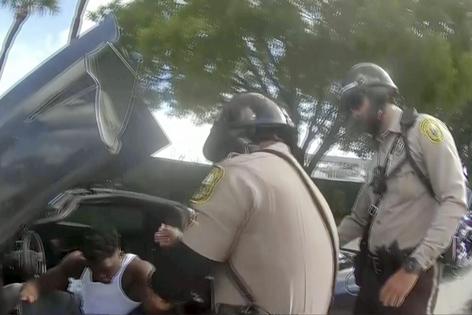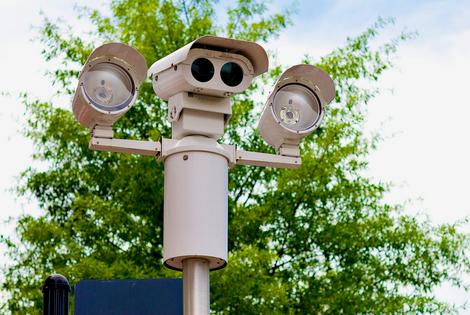Police stop more Black drivers, while speed cameras issue unbiased tickets − new study from Chicago
Published in Political News
Traffic stops by Chicago police have more than doubled over the past nine years in what the American Civil Liberties Union, a civil rights group, is calling the “new stop-and-frisk.”
Stop and frisk is when officers stop and search people based on “reasonable suspicion” that they are involved in criminal activity. The practice has been documented to disproportionately target Black and Latino people – not only in Chicago but also in New York and across the United States. In Chicago, it has declined sharply since a 2015 reform agreement between the ACLU and the Chicago Police Department.
Meanwhile, traffic stops have surged in Chicago, rising from less than 200,000 in 2016 to over 570,000 in 2023. And much like stop and frisk, police disproportionately stop Black drivers in Chicago, according to our latest study examining racial bias in traffic enforcement.
Our research, published in June 2024, used data on the racial composition of drivers on every street in Chicago. We then compared who is driving on roads with who is being ticketed by the city’s speed cameras and who is being stopped by the Chicago police.
Our findings show that when speed cameras are doing the ticketing, the proportion of tickets issued to Black and white drivers aligns closely with their respective share of roadway users. With human enforcement, in contrast, police officers stop Black drivers at a rate that far outstrips their presence on the road.
For instance, on roads where half of drivers are Black, Black drivers receive approximately 54% of automated camera citations. However, they make up about 70% of police stops.
On roadways where half of the drivers are white, white drivers account for around half of automated citations – and less than 20% of police stops.
Our research adds to other evidence that shows racial bias is a problem in traffic enforcement – a problem sometimes summarized as “driving while Black.”
The civil rights era of the 1960s was rife with law enforcement incidents that targeted Black drivers. As the scholar and historian Gretchen Sorin details in her 2020 book “Driving While Black,” the car simultaneously opened new possibilities of freedom as well as new hazards for Black people.
By the 1990s, the whole world witnessed the punishment that could await those caught driving while Black. In 1991, a Black man named Rodney King was stopped after a high-speed chase and beaten by police in Los Angeles. The violent encounter, captured on videotape and shared on local media, became national news.
The officers’ acquittal sparked the 1992 Los Angeles riots, in which widespread unrest and violence killed over 50 people, injured thousands and inflicted $1 billion in property damage.
In recent years, the police killings of Daunte Wright, Tyre Nichols and other Black drivers have shown how traffic stops can escalate quickly and sometimes lethally.
In September 2024, Miami Dolphins player Tyreek Hill was pulled over by local police on his way to a game at the Hard Rock Stadium in Miami Gardens, Florida. Police officers physically pulled Hill from his vehicle and handcuffed him. The incident raised questions about the officers’ aggressive use of force.
All humans have biases. These biases can become dangerous when those humans are police – agents of the state who are armed and empowered to make our cities safer.
And even when there’s no excessive use of force, disparate enforcement erodes trust between communities and police.
In recent years, as national conversations around racial bias in policing have accelerated, many police departments have implemented programs such as implicit bias training to establish fairer enforcement. While these initiatives appear to have an effect on officers’ attitudes about implicit bias, they do not seem to change the racial breakdown of whom police stopped, searched or arrested.
To reduce enforcement disparities and improve how traffic violations are handled, more fundamental reforms are likely necessary.
Several recent potential reforms of traffic enforcement center on decriminalization and de-escalation.
Legislators in Illinois recently proposed a bill that would prohibit traffic stops solely based on noncriminal and minor offenses such as improper vehicle registration, seat belt violations or lane usage mistakes.
Berkeley, California, is considering using trained civilians for traffic enforcement to reduce the opportunity for escalation. The idea is akin to how parking enforcement is done in many cities, including Chicago, which has unarmed parking units separate from the police.
The rationale for many police traffic stops is safety, which should remain a priority. Between 2013 and 2022 in Chicago, crashes on average killed 44 pedestrians, seven bicyclists and 78 vehicle passengers each year.
In contrast, the Norwegian capital of Oslo had four traffic deaths a year between 2015 and 2019. If Chicago’s streets were as safe as Oslo’s, crashes would kill 15 people each year – not 129.
More reliance on automated traffic enforcement could improve traffic safety and transform policing.
Cameras can detect dangerous moving violations, such as serious speeding and running red lights, without the need for immediate police involvement. Automated enforcement alone won’t guarantee safe streets, but cameras have reduced fatal and serious injury crashes substantially where deployed, including in Chicago.
Over half of police stops in Chicago for 2023 were license plate, registration or equipment related. Automating enforcement of such nonmoving violations would eliminate a major reason for police-driver interaction, reducing the potential for bias and escalation.
This, in turn, would free police resources to focus on nontraffic priorities.
And as our data shows, cameras are equal opportunity ticketers: They don’t have racial bias and carry no risk of escalation.
This article is republished from The Conversation, a nonprofit, independent news organization bringing you facts and trustworthy analysis to help you make sense of our complex world. It was written by: Wenfei Xu, Cornell University; David Levinson, University of Sydney; Michael J Smart, Rutgers University, and Nebiyou Yonas Tilahun, University of Illinois Chicago
Read more:
Driver’s license suspensions for failure to pay fines inflict particular harm on Black drivers
Police traffic stops can alienate communities and lead to violent deaths like Tyre Nichols’ – is it time to rethink them?
‘Traveling while black’ guidebooks may be out of print, but still resonate today
David Levinson has received research funding from ARC, UDIA-NSW, iMOVE, and Sydney Metro. He is affiliated with WalkSydney and Peaceful Bayside.
Nebiyou Tilahun has received funding from the Chicago Department of Transportation and the Illinois Department of Transportation.
Michael J Smart and Wenfei Xu do not work for, consult, own shares in or receive funding from any company or organization that would benefit from this article, and have disclosed no relevant affiliations beyond their academic appointment.































































Comments